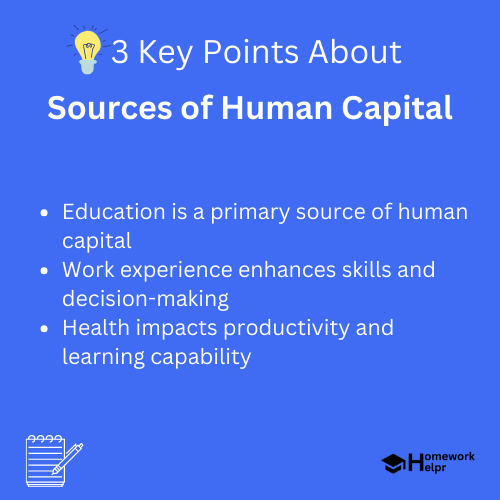📝 Summary
In the domain of human capital, the collective skills, knowledge, and experience of individuals are crucial for productivity and economic growth. Key sources include education, which lays the foundation for skill development, and work experience, gained through practical application and training. Additionally, health and well-being significantly enhance productivity, while social and cultural influences shape access to opportunities. Technological advancements enable skill enhancement through online learning, and supportive government policies further facilitate human capital development, contributing to overall societal advancement and economic performance.
Understanding the Sources of Human Capital
In the realm of economics and human development, the term human capital refers to the collective skills, knowledge, and experience possessed by individuals. It plays an essential role in enhancing productivity and is a driving force for economic growth. The sources of human capital can be broadly categorized into various domains that contribute to the development and enhancement of human skills and competencies.
Education as a Primary Source
One of the most significant sources of human capital is education. Education provides individuals with the necessary knowledge and skills to navigate through various aspects of life and work. It encompasses different levels, including:
- Primary Education
- Secondary Education
- Tertiary Education
- Vocational Training
Each level lays a foundation for further development. For instance, primary education introduces basic literacy and numeracy skills, while tertiary education can lead to advanced knowledge in specific fields such as engineering or medicine.

Work Experience and On-the-Job Training
Work experience is another critical source of human capital. It includes the knowledge and skills gained through practical application in the workforce. On-the-job training, internships, and apprenticeships allow individuals to gain valuable skills while improving their understanding of industry practices. Experience enhances decision-making, problem-solving, and interpersonal skills.
Examples
For example, a software developer not only learns programming through education but also hones problem-solving skills by working on real projects at a tech company. This experience makes them more valuable in the job market.
Health and Well-being
Health plays a crucial role in developing human capital. A healthy individual is likely to be more productive, energetic, and capable of performing tasks efficiently. Investing in healthcare and wellness programs can significantly improve an individual’s ability to learn and work effectively. Key aspects include:
- Access to healthcare
- Nutritional support
- Mental health services
For instance, a well-nourished child may perform better academically due to improved concentration and cognitive function.
Definition
Healthcare: The organized provision of medical care to individuals or communities.
Social and Cultural Influences
Social and cultural factors also contribute significantly to human capital. Family background, community values, and social networks can enhance or restrict access to opportunities for education and development. Supportive environments foster personal growth and encourage individuals to pursue their goals.
Examples
For instance, a student from a family that values education is more likely to excel academically compared to a student from a background that downplays the importance of learning.
❓Did You Know?
The concept of human capital was popularized in the 1960s and has since become an integral part of economic theory, reflecting how investing in people can yield economic returns.
Technological Advancements as a Catalyst
In today’s digital age, technology has become an indispensable source of human capital. Technological advancements provide individuals with access to information and learning resources that were previously unavailable. Online courses, webinars, and virtual workshops allow people to enhance their skills from the comfort of their homes.
For instance, platforms like Coursera, Udemy, and Khan Academy offer courses spanning various subjects, allowing learners to upgrade their knowledge at their own pace.
Definition
Webinar: A seminar conducted over the internet that allows participants to engage in discussions and presentations.
The Role of Policy and Government in Enhancing Human Capital
Government policies can facilitate the development of human capital through various initiatives and programs. These can include:
- Investment in public education
- Subsidies for vocational training
- Healthcare reforms for accessibility
By prioritizing human capital development, governments can ensure a more skilled workforce that ultimately leads to improved economic performance.
Examples
A government initiative that provides free college education can enable individuals from low-income families to pursue higher knowledge and thus elevate overall human capital in the country.
Conclusion
In summary, the sources of human capital are diverse and interconnected, influencing an individual’s ability to thrive in society. Education, work experience, health, social influences, technological advancements, and supportive government policies all play a pivotal role. As we invest in these sources, we not only enhance individual potential but also contribute to economic growth and societal advancement.
Understanding and maximizing these sources can lead to a better future, providing opportunities for personal and professional development. As students and future professionals, recognizing the importance of these elements helps you to cultivate your own human capital, ensuring lifelong learning and success.
Related Questions on Sources of Human Capital
What is human capital?
Answer: It refers to skills, knowledge, and experience of individuals.
Why is education important for human capital?
Answer: Education provides necessary knowledge and skills for success.
How does health influence human capital?
Answer: Healthy individuals are more productive and efficient in tasks.
What role does technology play in human capital?
Answer: Technology provides access to resources for skill enhancement.
